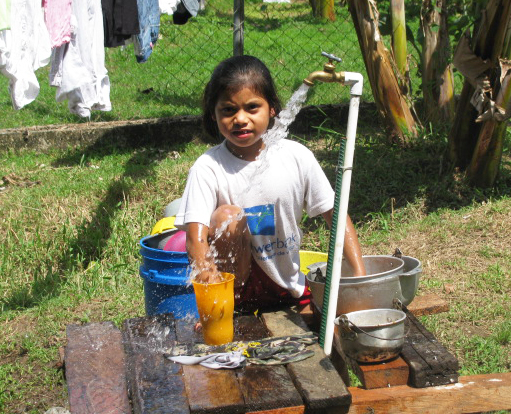

Water leads to empowerment in rural Panama

Until recently, the inhabitants of Bisira had only two ways to get water -- collecting rain or drinking from the river Cricamola, on whose banks they live. In this region in northwest Panama, fully 70% of people do not have access to safe water or sanitation.
Beyond the logistical difficulties that this poses, the lack of clean water and sanitation is a health hazard that produces diarrhea and other gastrointestinal and skin diseases. The child mortality rate in this region, where most of the country’s indigenous people live, is almost 2.5 times higher than the national average.
But for the past three years, Bisira and neighboring villages have been changing this situation through an MDG-F-supported joint UN programme that focuses both on improving infrastructure as well as on strengthening the villagers’ capacity to organize and manage their own water and sanitation systems.
“Our job is to ensure that the communities have water, and also that they pay their fees,” says Elena Mixila Castillo, president of Bisira’s Administrative Board of Rural Aqueducts (JAAR). “We’re responsible for the administration, operation and maintenance of the system.”
Encouraging local water management
Ninety-one per cent of the indigenous population of the Ngöbe-Buglé Region, where the water programme operates, live in extreme poverty. Their dispersion, mobility and location in remote and inaccessible areas make traditional sanitation solutions too costly and limit investment and private participation. The aim of the joint programme is to empower rural and indigenous populations to manage their own water resources and thus improve the quality of, and access to, public water and sanitation services.
JAAR president Castillo and Carmen Villagra, the JAAR’s Treasurer, say that before the joint programme began, the Board was poorly organized and not an effective advocate for Bisira’s residents. Now, they say, not only has it organized and trained the villagers in water management and maintenance, it has been able to reduce delinquency in water payments and increase water fees by eight-fold. Bisira’s Board now regularly meets with the JAARs from Kankinú and Sirain, two neighboring communities which share the same aqueduct.
“We’re elected for two-year terms by men and women who are up-to-date on their water payments. Anyone who hasn’t paid has neither a voice nor a vote in the assembly,” says Villagra.
A voice and a vote
This model of community development, particularly the dedicating of equipment to local administrative groups, is the key to the success of the joint programme, part of the MDG-F’s effort to help countries around the world achieve the anti-poverty Millennium Development Goals. Central to the MDG-F’s work is reducing inequalities and improving living conditions for the most marginalized populations, including indigenous people, women and youth.
The joint programme is a collaboration between three United Nations agencies (PAHO, UNICEF and ILO) and the Panamanian Ministry of Health, the Ministry of Economy and Finance, traditional leaders and communities in the Ngöbe-Buglé indigenous territory.